Durban has opted for a less theatrical approach to attracting visitors to Surf City for the December holidays – unlike last year, when eThekwini Mayor Mxolisi Kaunda donned a pair of baggies and swimming goggles, and leapt into the sea in front of media cameras to “prove” just how clean the water was.
But the city still put on a show this week, with Kaunda returning to the beachfront to announce details of the city’s festive season preparations for holidaymakers.
For a few hours, this was probably the safest place to be in South Africa – with the men and women in blue from eThekwini Metropolitan Police vastly outnumbering early-morning strollers along the southern section of Durban’s 8km beachfront promenade.
Well over 100 emergency service vehicles – ranging from patrol cars to fire engines and rubber ducks for surf rescue – were lined up like soldiers, stretching from the uShaka Marine World entrance to the car park at the top of Bell Street. (It included 62 brand-new Toyota Corolla Cross XS Metro Police patrol cars, valued at close to R25-million).
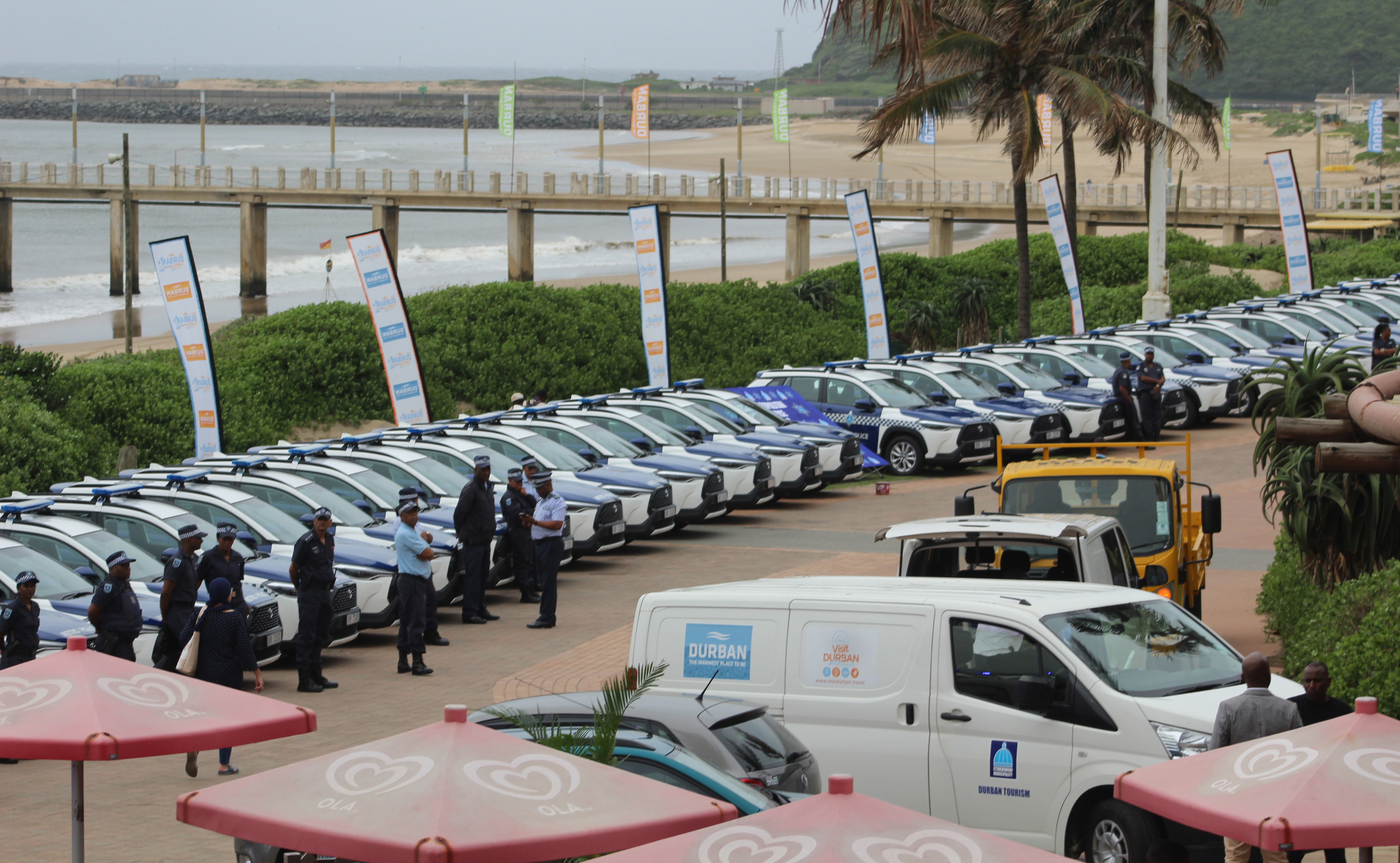 eThekwini Metro Police officers and their new fleet of 62 patrol cars line the Durban promenade during the 'state of readiness' show ahead of the Christmas holiday season. (Photo: Tony Carnie)
eThekwini Metro Police officers and their new fleet of 62 patrol cars line the Durban promenade during the 'state of readiness' show ahead of the Christmas holiday season. (Photo: Tony Carnie)
Dressed in one of his many stylish blue shirts, Kaunda appeared promptly at 10am to review a squad of Metro Police officers, urging them to “declare war on crime”.
Every resident and every visitor to Durban needed to feel safe, he said, whichever part of the city they visited over the Christmas season.
“Human rights are for visitors and residents – not for the skebengas or para-paras [criminals or drug addicts],” he said.
Moving from his temporary review stand on the promenade to a nearby marquee and podium at the Wahooz beach club, Kaunda reiterated his strong message about security to the media and invited guests, before tackling the more ticklish issue of sewage pollution in the sea.
“We are pleased that, as a city, we have pulled out all the stops to ensure that our residents and visitors have a wonderful stay in Durban,” he declared.
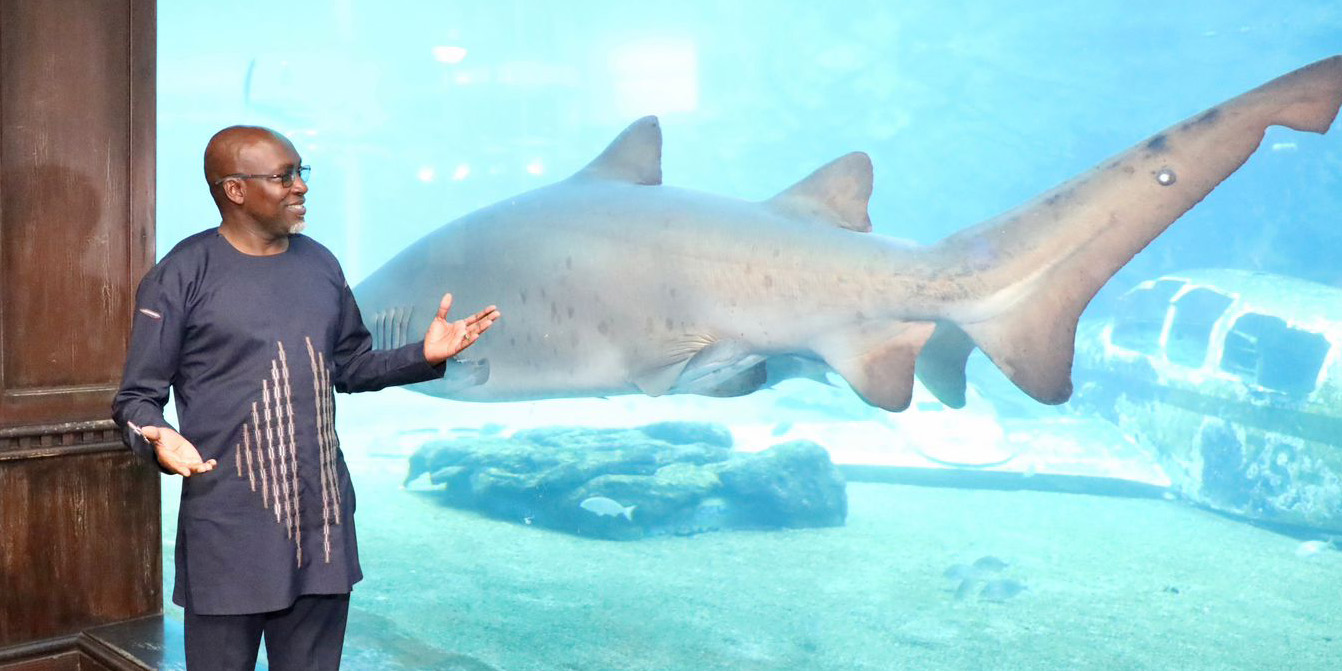 eThekwini Mayor Mxolisi Kaunda shows off the shark tank at uShaka Marine World during his Durban beachfront promenade tour. (Photo: eThekwini Municipality)
eThekwini Mayor Mxolisi Kaunda shows off the shark tank at uShaka Marine World during his Durban beachfront promenade tour. (Photo: eThekwini Municipality)
Durban was anticipating an estimated 950,000 visitors. The hotel occupancy rate expected this year was around 62%, compared with the 57% achieved last year.
“We also want to assure our visitors that when they come to Durban, they will find the city clean, our warm beaches and swimming pools open. Currently, the city has 23 bathing beaches and 34 swimming pools that are open and safe for swimming.
“Recently, we conducted a joint sampling programme of water quality with Adopt A River, a nonprofit organisation whose samples are tested by an independent laboratory, Talbot. We are pleased that the water quality results were comparable and reflected that our water was safe for swimming.”
This joint sampling was to enable credible comparison of results and to “ensure transparency and public safety”, he said – after an embarrassing transparency blunder the previous week when the city’s communications team withheld a recent set of joint test results that showed very high sewage bacteria readings at six central beaches on 16 November after heavy rains – some of them 30 times higher than the maximum level of 500 units of E. coli for safe bathing.
Since then, however, the seas had cleared and E. coli readings at the central and other beaches were now either rated “excellent” or within accepted safety levels.
In reference to recent interruptions to tap water supply in several parts of the city, Kaunda acknowledged that these shortages “might have caused some anxiety among our residents and visitors during this period”.
“We want to assure you that our teams have been working tirelessly to restore water supply in many areas that were affected by the temporary shutdown of Umgeni-uThukela Water systems. As of yesterday, most areas in the north and south had already started to receive water as our network is stabilising,” he said, adding that the Umgeni-uThukela water utility company had committed to supplying an additional 160 megalitres of water per day to Durban to ensure adequate supply over the festive season.
https://www.youtube.com/watch?v=MM6ivA6tG9E
A contingent of 168 contract security personnel had been hired to conduct regular patrols with the police across the city and on the beaches.
To control traffic on the beachfront, several roads would be subject to access controls, and a free park-and-ride facility would be available from 7am to 12pm daily.
“In addition, we have employed over 500 seasonal workers who will be deployed to various tourist destinations so that they can quickly attend to any issues that may arise. These include 65 beach guides to be stationed across the various beaches to help visitors.”
An extra 160 seasonal lifeguards had been hired to ensure the safety of bathers, and the city had procured nearly 200,000 wristbands to deal with lost children.
“Unfortunately, we know that around this time we experience a high number of children who get separated from their parents or guardians. We wish to plead with adults accompanying children to our beaches to work with us to ensure that every child wears a wristband which contains the details of their guardians.”
A squad of 38 child-minders had been hired to look after lost children in seven tents until they were reunited with their guardians.
“Apart from our warm beaches, visitors can also enjoy walking and cycling along our promenade, as well as luxury shopping at our shopping malls.”
Elsewhere, visitors could enjoy hikes in nature reserves such as Paradise Valley, game drives at the PheZulu Safari Lodge, horseback riding at Amanzimtoti, or helicopter rides and boat cruises at Inanda Dam.
Family-friendly activities included Ricksha Bus tours, visits to uShaka Marine theme park, Umgeni Bird Park, Segway Slides at Moses Mabhida Stadium and mountain biking at Giba Gorge.
Over recent years, Durban’s beach water quality has fluctuated and several beaches have been closed to bathing at times, deterring potential visitors.
Although the city has sought to portray sewage pollution problems as a legacy of wastewater infrastructure damage during the April 2022 floods in KwaZulu-Natal, beach water quality has in fact been patchy for years, owing to poor maintenance of sewage treatment works, pump stations and stormwater drains. The problems have been exacerbated by high pollution loads in rivers and by load shedding causing sewage overflows when pump stations are without power.
Kaunda and the Durban Chamber of Commerce and Industry recently announced their ambition for the city to re-enter the international Blue Flag beach quality assurance scheme. No date has been set.
Smaller municipalities on the KwaZulu-Natal north and south coasts have retained nine Blue Flags. The Western Cape has 35 Blue Flags and Eastern Cape 10. - Tony Carnie
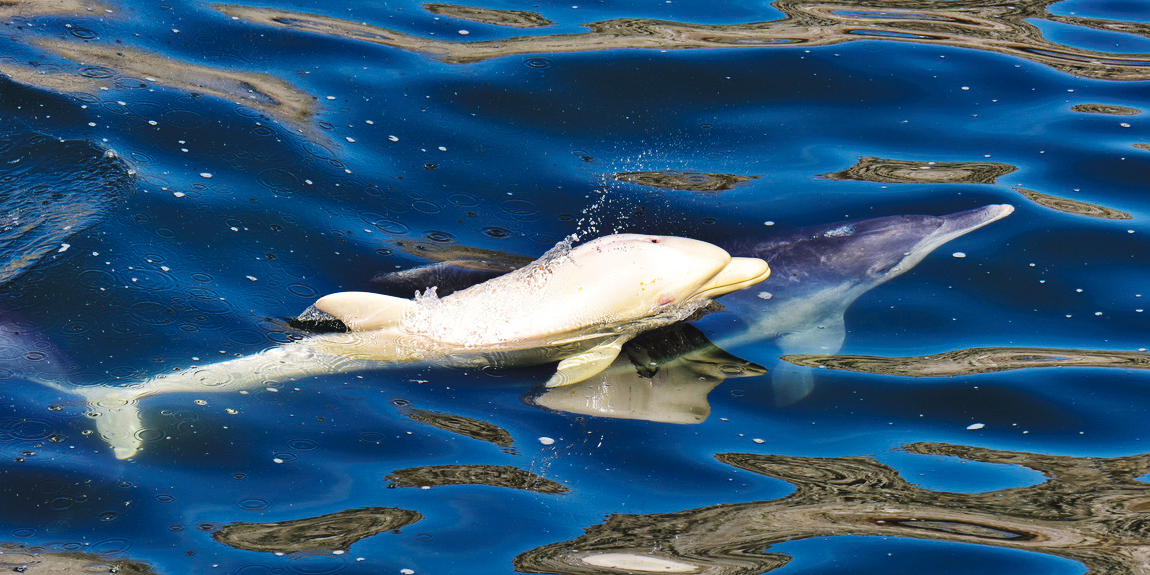 Popcorn, the only white bottlenose dolphin in the world. (Photo: Raggy Charters)
Popcorn, the only white bottlenose dolphin in the world. (Photo: Raggy Charters)
The state of affairs in the Eastern Cape
While frequent robberies, darkness because of faulty streetlights and allegations of sewage pollution hang over Nelson Mandela Bay’s beachfront, there are some positives to consider.
Apart from frequent dolphin and whale sightings, and family-friendly beaches, Algoa Bay is also home to Popcorn, thought to be the only white bottlenose dolphin in the world.
Although there are allegations of sewage spills into the sea, not helped by a resounding silence from the municipality, dedicated swimmers said all is well at the moment.
“Frankly, I swim every day and I am not dead yet,” Dale Clayton from the Zwartkops Conservancy said. He said organisations protecting the sealife and the Swartkops River were working incredibly hard to minimise the impact of the Nelson Mandela Bay’s failing sewage system.
“But people must come and join this holiday. We swim and boat and paddle every day. I would just avoid upstream in the Swartkops River and I won’t swim in the river after heavy rains.”
He said the Nelson Mandela Bay municipality does not share E. coli water results and the Zwartkops Conservancy is currently in court to obtain an order to get access.
An independent testing report issued on 30 November found that both Hobie Beach and Humewood Beach, which hold Blue Flag status, demonstrated pristine water quality without any faecal indicators.
“These beaches, located in the tourist-rich area within the NMBM [Nelson Mandela Bay municipality], provide an excellent bathing experience for visitors, and from the results it is clear that there are no immediate health risks,” the report states.
No trace of E. coli contamination was found at Maitlands Beach either.
St George’s Beach, which services mostly the Motherwell township and, to an extent, KwaZakhele and New Brighton, exhibited high levels of cleanliness and hygiene. This beach was also found to be free from faecal contamination.
At New Brighton Beach, however, high levels of E. coli contamination were found. According to the report, the level was 45 times higher than the Blue Flag standard and the presence of Streptococcus bacteria was 87 times higher. The pathways were littered with broken glass and there was oil from an offshore oil spill on the water.
The chairperson of Discover Nelson Mandela Bay, Andrew Stewart, said the private sector has joined hands with the police and the municipality to ensure a safe festive season.
“I am an open-water swimmer and I can confirm that we have not had a sewage spill in the bay in at least two months,” he said.
“We still have some of the best, clean, healthy beaches to swim at…
“We have family-friendly facilities and there will be enough lifeguards. And really, come and see Popcorn. Our little dolphin is still around.”
Kouga
The DA-led Kouga municipality, based in Jeffreys Bay, is the only one that makes E. coli figures available for its beaches.
There are a number of Blue Flag beaches in this municipality: Dolphin Beach, Cape St Francis Beach and Marina Martinique (a private beach).
Popular Paradise Beach, the Seekoei Estuary and Aston Bay all tested very low for E. coli (between six and 72 per 100ml).
Monique Basson from the municipality said it would launch its safety plan for the beaches soon.
Port Alfred
The latest E. coli results obtained for the rivers and lagoons within the Ndlambe municipality have shown no sewage pollution for Bushmans River, Kowie, Riet, Kleinemonde, Kasouga, Kariega and the lagoon at Boknes.
The municipality has not responded to questions about its safety plans for the festive season.
In a letter from Lindsay Burrow, the chairperson of the Port Alfred Ratepayers and Residents’ Association, the community has objected to the municipality planning a R700,000 festive season music festival while beach facilities are in disrepair.
Buffalo City
The Buffalo City metro also did not answer questions about the E. coli levels at its beaches. But on 30 November, it launched a revamped beach precinct named after the late South African boxer and karate champion Leighandre “Baby Lee” Jegels, who was shot and killed by her police officer boyfriend in 2019.
The R87-million revamped beachfront was a project of the Buffalo City Metropolitan Development Agency, and boasts a new walkway, information centre and ablution building, hawkers’ stalls, a jungle gym and an outdoor gym area. - Estelle Ellis/DM
This story first appeared in our weekly Daily Maverick 168 newspaper, which is available countrywide for R29.
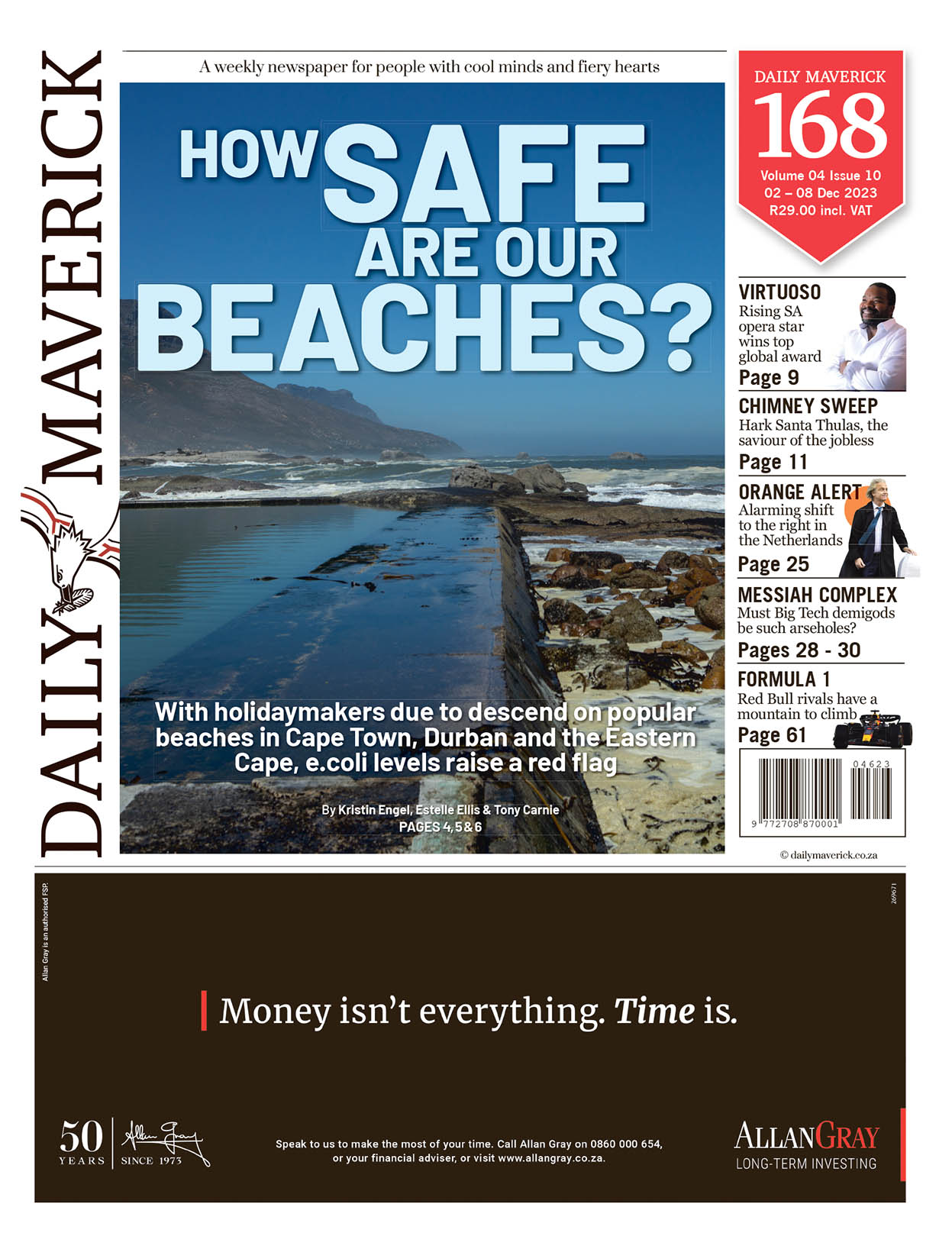




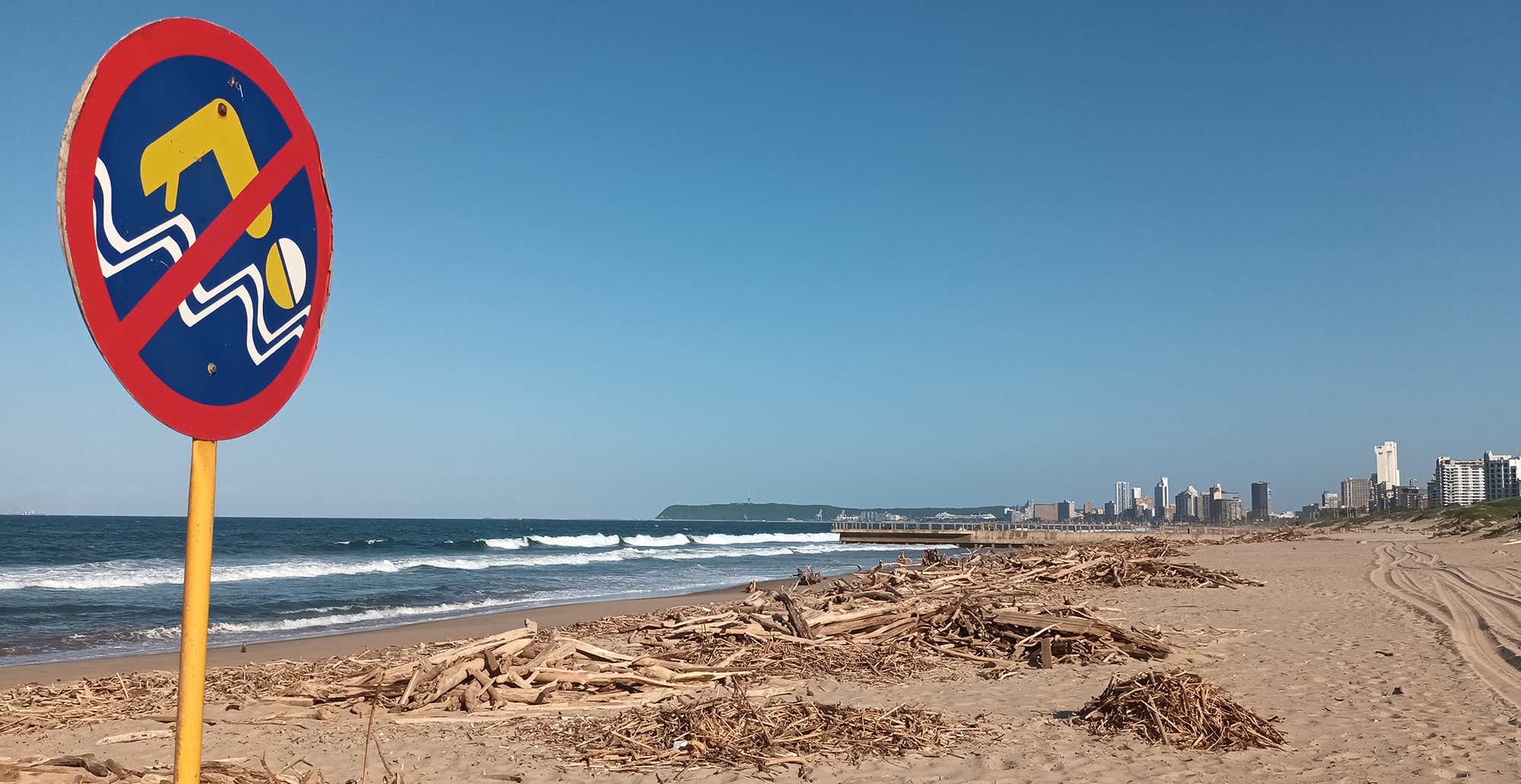 Popcorn, the only white bottlenosed dolphin in the world. Photo: Raggy Charters
Popcorn, the only white bottlenosed dolphin in the world. Photo: Raggy Charters